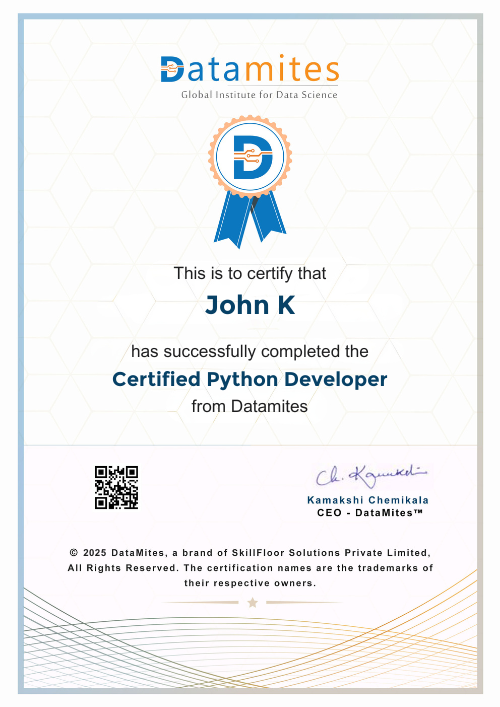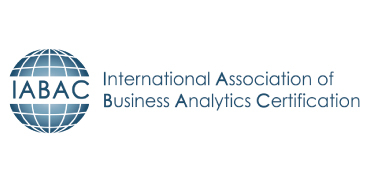Instructor Led Live Online
Self Learning + Live Mentoring
Customize Your Training

• Introduction of python
• Installation of Python and IDE
• Python Variables
• Python basic data types
• Number & Booleans, strings
• Arithmetic Operators
• Comparison Operators
• Assignment Operators
• IF Conditional statement
• IF-ELSE
• NESTED IF
• Python Loops basics
• WHILE Statement
• FOR statements
• BREAK and CONTINUE statements
• Basic data structure in python
• Basics of List
• List: Object, methods
• Tuple: Object, methods
• Sets: Object, methods
• Dictionary: Object, methods
• Functions basics
• Function Parameter passing
• Lambda functions
• Map, reduce, filter functions
• Decorators
• Generators
• Context Managers
• Metaclasses
• Inheritance and Polymorphism
• Encapsulation and Abstraction
• Class methods and static methods
• Special (magic/dunder) methods
• Property decorators - getters, setters, and deletes
• Working with files
• Reading and writing files
• Buffered read and write
• Other file methods
• Logging & Debugger
• Modules and import statements
• SQL Basics
• Creating DB Table
• INSERT, READ, UPDATE, DELETE
• Introduction to MongoDB
• CRUD operations in MongoDB
• namedtuple(), deque, ChainMap,
• Counter, OrderedDict, defaultdict,
• UserDict, UserList, UserString
• Exceptions handling with try-except
• Custom exception handling
• List of general use exception
• Best practice exception handling
• Generators, Iterators
• The Functions any and all
• With Statement
• Data Compression
• A Daytime Server
• Clients and Servers
• The Client and Server Programs
• Classes and Threads
• Multi-threading; thread life cycle
• Regular Expression Syntax
• Group, Split and wildcards
• Quantifiers
• Match, Search and Find all methods
• Character Sequence
• Introduction to OpenCV, Installation
• Basic Operations on Images
• Image Filtering
• Image Classification
• Introduction to GIT
• Basic Git commands
• Introduction to Flask and Installation
• Creating project
• Routing,templates, forms and database integration
• Deployment on render
• Django Introduction and Installation
• Creating a Project
• Django Architecture and File Structure
• Folder Structure, First Django project
• Database and Views, Static Files and Forms
• URL Mapping and Routing
• Defining Models and Relationships
• Database Migrations and Schema Changes
• Querying Data using Django ORM
• Model Forms and Form Validation
• HTML Forms in Django
• Model Forms and Form Validation
• Formsets and Inline Formsets
• File Uploads and Validation
• Deploying Django Applications
• Hosting Options (e.g., Heroku, AWS)
• Project Showcasing and Review
Python is a dynamic language that supports multiple programming paradigms, including procedural, functional, and object-oriented programming.
Python was first developed in the late 1980s by Guido van Rossum.
Both Python and Java are popular programming languages, but they differ in their syntax, programming philosophy, and application areas. Python is known for its simplicity and elegance, while Java is often used for complex enterprise applications.
Python programming language boasts a range of advantages, including its simplicity of syntax, solid community backing, expansive libraries of pre-built code, and diverse applicability across various sectors. Its flexibility and ease of use make it a primary option for developers and businesses, leading to increased efficiency and accelerated development cycles.
Some of the professions that frequently demand expertise in Python programming language include Data Scientist, Software Developer, Machine Learning Engineer, Data Analyst, Artificial Intelligence (AI) Researcher, Research Analyst, Financial Analyst, and DevOps Engineer.
Python is a beginner-friendly programming language, and individuals with no prior programming experience or a specific educational background can learn it.
The cost of Python courses can vary based on the institution or training provider, with fees typically ranging from several hundred to several thousand dollars.
Soft skills such as strong problem-solving skills, logical thinking, effective communication, collaboration, adaptability, and a willingness to learn can be beneficial when starting to learn Python.
A python developer salary in Columbus is $122,590 as per Indeed.com.
You do not need any specific qualifications or skills to enroll in Python courses in Columbus. However, it is recommended to have a basic understanding of programming concepts and some mathematical knowledge to succeed in the course.
A Python certification in Columbus can enhance a candidate's employability and open up opportunities for career advancement. Employers often look for certified professionals as it provides them with assurance of their skills and knowledge.
Python's popularity in data science is due to its flexible and efficient libraries and tools, making it an invaluable skill for anyone pursuing a career in data science.
For those seeking a comprehensive and high-quality Python training program in Columbus, the Certified Python Developer Course is a top recommendation, offering a well-rounded curriculum that caters to beginners and experts alike.
The eligibility criteria for the DataMites Certified Python Developer Training in Columbus are straightforward. You only need to have a passion for coding and a willingness to learn Python.
DataMites™ is a well-known institution accredited by the International Association of Business Analytics Certification (IABAC). With more than 25,000 students enrolled globally, we offer a comprehensive learning program that includes self-study materials, live online training, and practical project work and placements. Our courses cover a wide range of data science topics and provide hands-on experience with real-world scenarios.
The duration of DataMites Python courses in Columbus varies depending on the specialization. The Python Developer Course takes three months to complete, while other courses take two months. Students can choose between weekday and weekend classes.
The fees for Python courses at DataMites in Columbus are flexible, starting from 253 USD to 380 USD, while the Certified Python Developer Training costs range between 253 USD to 418 USD.
We do not currently offer offline Python training in Columbus, but our online courses are highly interactive and designed to provide you with an engaging and comprehensive learning experience.
DataMites Flexi-Pass for Python Training in Columbus offers candidates an extended period of three months to attend sessions and seek clarifications, making it a great option for those who need more time to learn.
DataMites will provide you with a certificate of completion after you complete the course as evidence of your successful completion of the program.
We encourage students to attend our demo class before making a decision. It provides an overview of our Python training program.
DataMites accepts a range of payment modes to make the payment process hassle-free for our students. These payment modes include Cash, Net Banking, Check, Debit Card, Credit Card, PayPal, Visa, Mastercard, and American Express.
The DataMites Placement Assistance Team(PAT) facilitates the aspirants in taking all the necessary steps in starting their career in Data Science. Some of the services provided by PAT are: -
The DataMites Placement Assistance Team(PAT) conducts sessions on career mentoring for the aspirants with a view of helping them realize the purpose they have to serve when they step into the corporate world. The students are guided by industry experts about the various possibilities in the Data Science career, this will help the aspirants to draw a clear picture of the career options available. Also, they will be made knowledgeable about the various obstacles they are likely to face as a fresher in the field, and how they can tackle.
No, PAT does not promise a job, but it helps the aspirants to build the required potential needed in landing a career. The aspirants can capitalize on the acquired skills, in the long run, to a successful career in Data Science.



